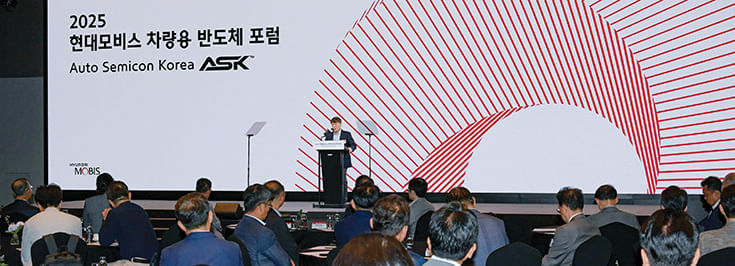Automotive components and technology developer Hyundai Mobis, which is a key member of the Hyundai Motor Group, recently hosted the first ‘Auto Semicon Korea’ (ASK) conclave in Seoul. The event is part of the company’s effort to strengthen automotive semiconductor competitiveness and expand the ecosystem in Korea.
Hyundai Mobis is leading the collaboration of 23 companies and research institutions, including automakers, fabless companies, foundries, design houses, packaging companies, and design tool specialists. This initiative, which marks the first private-sector-led ‘K-automotive semiconductor’ cooperation, is expected to contribute to Korea’s domestic automotive semiconductor industry development alongside core semiconductor localization.
The event was attended by Hyundai Mobis president Lee Gyu-suk, along with numerous C-suite executives and relevant officers from major companies, including Samsung Electronics, LX Semicon, SK keyfoundry, DB HiTek, GlobalFoundries, Dongwoon Anatech, and Korea Electrotechnology Research Institute (KERI)
Aiming to reduce reliance on overseas chip supplies
This marks the first joint initiative led by private companies, including Hyundai Mobis, to address the automotive semiconductor industry. Until now, the automotive semiconductor sector has been heavily reliant on foreign products from Europe, North America, and Japan. Korean companies have now united to form a self-sustaining value chain and create new business opportunities to improve this situation.
Hyundai Mobis plans to play a leading role in fostering the Korean automotive semiconductor industry alongside the major companies participating in the forum. As a global Tier 1 automotive supplier, Hyundai Mobis states that it occupies a strategic position connecting technology and demand between automakers and semiconductor suppliers. Furthermore, the company is simultaneously a fabless company designing semiconductors and a supply chain manager, positioning it as a prime candidate to lead the Korean semiconductor industry.
In his keynote address, Hyundai Mobis president Lee Gyu-suk said: “We are securing independent semiconductor design capabilities while pursuing joint development with fabless companies and design houses, and expanding cooperation with major foundries. We actively encourage companies specialized in home appliances or mobile to enter the mobility sector, and through this, we will take the lead in building the domestic ecosystem.”
Hyundai Mobis plans to play a pivotal role in developing ASK into Korea’s leading automotive semiconductor forum starting this year. The forum will be held annually, and starting next year, participation will be encouraged from startups and existing companies possessing semiconductor-related technologies. The forum will also open its doors to relevant associations and major institutions.
![]()
Hyundai Mobis is leading a private-sector alliance with 23 leading Korean companies and labs to strengthen the domestic automotive semiconductor ecosystem.
Aiming to build a stable local supply chain
Park Chul-hong, executive VP and head of the Semiconductor Business at Hyundai Mobis, emphasized the importance of synergy between automotive semiconductors and controllers. He said: “The key to automotive semiconductors lies in optimal integration with the controller. To enhance the differentiated competitiveness of domestic companies, Hyundai Mobis defines controller-specific specifications and supports real-vehicle-based validation, enabling significantly faster development cycles.”
In fact, Hyundai Mobis has projected that for drive systems, which determine EV range, pursuing integrated development rather than developing power semiconductors and core components separately could shorten the development time by up to nearly two years. This raises expectations that partners newly entering the automotive semiconductor field alongside Hyundai Mobis will be able to achieve results quickly.
The same applies to system semiconductors installed in controllers for core components. Hyundai Mobis is mass-producing a total of 16 types of semiconductors it developed in-house this year, including power, drive, communication, sensor, and data processing semiconductors, through external foundries. The volume reaches 20 million units. Analysis suggests that the more domestic companies participate, the faster results can be achieved in semiconductor localization, with significant economic ripple effects.
In January 2025, Qualcomm Technologies and Hyundai Mobis announced their technology collaboration to revolutionise the next generation of High-Performance Computer (HPC) platform. They will combine Qualcomm Technologies’ Snapdragon Ride Flex System-on-Chip (SoC) and Snapdragon Ride Automated Driving Stack with Hyundai Mobis’s cutting-edge software and sensors to deliver a comprehensive system solution that powers advanced infotainment and advanced driver assistance systems (ADAS), bringing a one-of-a-kind user experience to future vehicles.
This technology alliance merges the high-performance processing capabilities and software framework of the Flex SoC, which supports cockpit, advanced driver assistance systems (ADAS), and automated driving (AD) functionalities on a single chipset, with Hyundai Mobis’s cutting-edge software applications to deliver performance, enhanced safety, and increased efficiency for automakers across the globe.
Meanwhile, according to a global market research firm, the automotive semiconductor market is growing rapidly at an average annual rate of 9 percent. This market is projected to grow to approximately $135 billion (about Rs 11,24,685 crore) by 2030. Within this, Hyundai Mobis’ key order items – semiconductors for infotainment and connectivity, advanced driver assistance systems (ADAS), and electrification – are expected to account for about 70% of the total market.
Hyundai Mobis, the global No. 6 automotive supplier, has expertise in sensors, sensor fusion in ECUs and software development for safety control. The company’s products also include various components for electrification, brakes, chassis and suspension, steering, airbags, lighting, and automotive electronics. Hyundai Mobis operates its R&D headquarters in Korea, with four technology centres in the United States, Germany, China and India.
Images: Hyundai Mobis/X
ALSO READ: Hyundai Mobis reveals strategy to be a global Top 3 supplier
Hyundai Mobis future growth strategy targets high-growth China and India markets
